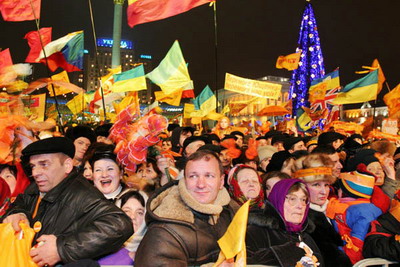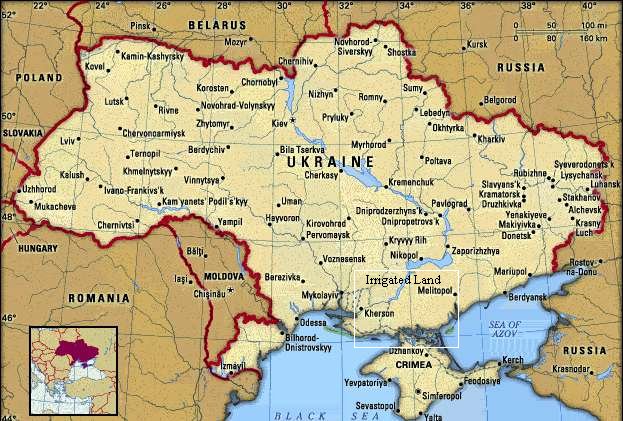This is the first presidential election in Ukraine since the Orange
Revolution of 2004 (picture below). Although the change in government after 2004 resulted in less firm governmental control over the press and a more pluralistic media, there is still a lack of balanced reporting.
 As elections draw near, there is reportedly increasing pressure on journalists and editors by media owners and political role players, with decreasing quality of impartial news.
As elections draw near, there is reportedly increasing pressure on journalists and editors by media owners and political role players, with decreasing quality of impartial news.
Hidden political ads
The Ukrainian Institute of Mass Information has been monitoring four
national print media outlets, analysing coverage of presidential candidates and identifying examples of coverage that may actually construe party political advertising, rather than editorial reporting.
In October 2009, the monitors found 37 published articles which contained breaches of professional and ethical standards of journalism. These articles were noted in the daily Fakty i kommentarii, the daily Segodnya, and the daily Economicheskie izvestia, with 30 out of 37 published in Fakti i kommentarii alone.
A fourth publication monitored, Korrespondent, revealed no such breaches. Monitoring over November further revealed 36 articles containing similar breaches of impartiality and balanced reporting, with 31 materials published in the Fakty i kommentarii.
Media’s key role
ARTICLE 19 and International Media Support stress the importance of elections to democracy, and to holding political parties and leaders accountable. The media, and in particular broadcasters, play a key role in framing electoral issues, informing the electorate about the main developments, and communicating the platforms, policies and promises of candidates to voters.
Free and fair elections are possible only where the electorate is well informed and has sufficient access to diverse information. A pluralistic media environment ensures that all viewpoints and political perspectives are aired during election campaigns.
We, therefore, call upon the Ukrainian media, both private and
publicly-funded to:
– Respect strict rules of impartiality and balance, particularly when
reporting on the governing parties and on government decisions and actions during election period. This implies that equal coverage should be given to all election candidates and the policy issues they stand for.
– Ensure that the Ukrainian public is well informed about election matters, including the role of elections in a democracy; about how to exercise the right to vote; about the key electoral issues; and the policy positions of the various candidates contesting the election. This should include reporting that involves questions being put to candidates, as well as providing space for debates between candidates.
– Grant all parties and candidates equitable access to the media to communicate their messages directly with the public. Equitable access means fair and non-discriminatory access, allocated according to objective criteria for measuring overall levels of support. This includes factors such as timing of access and any fees.
– Ensure that any reporting of opinion polls and election projections is accompanied by sufficient information to allow the electorate to understand properly their significance.
International Media Support (IMS) is a non-profit organisation working with media in countries affected by armed conflict, human insecurity and political transition. In more than 30 countries worldwide, IMS helps to strengthen professional practices and ensure that media and media workers can operate under challenging circumstances. This statement is issued within the framework of the IMS Media and Democracy Programme for Central and Eastern Europe and the Caucasus.





